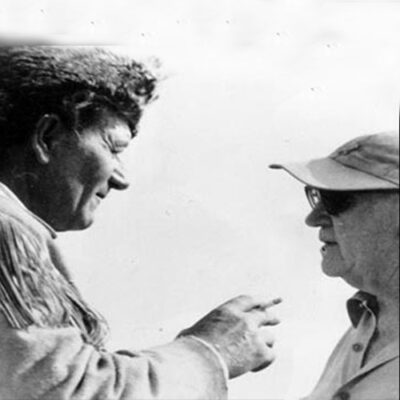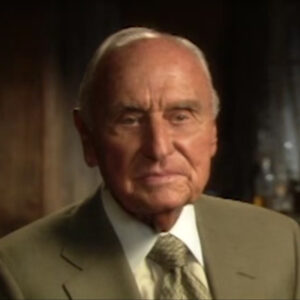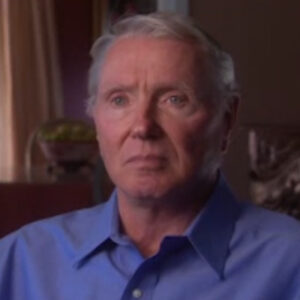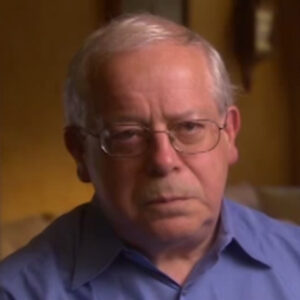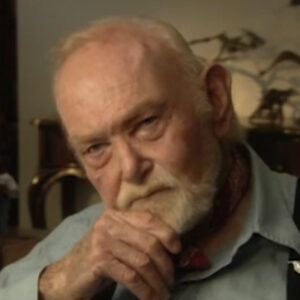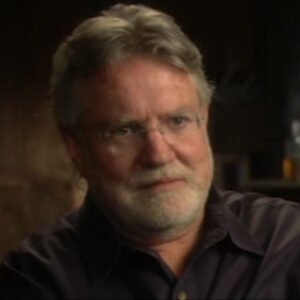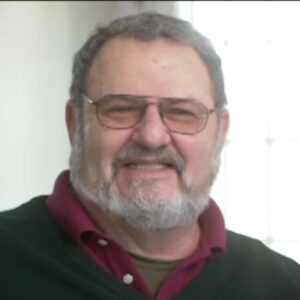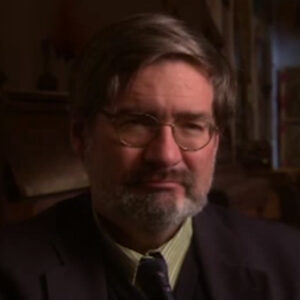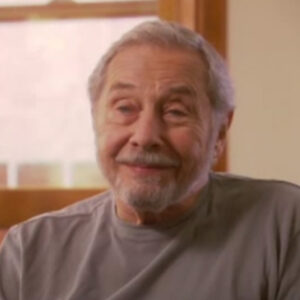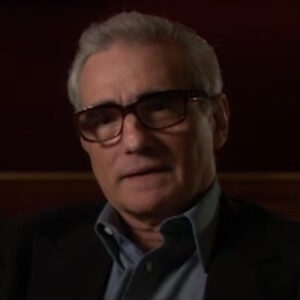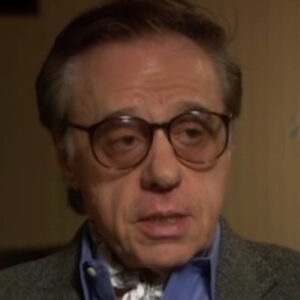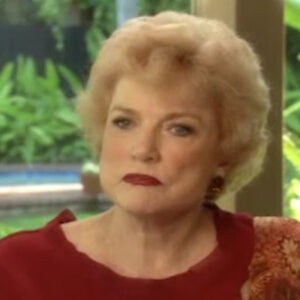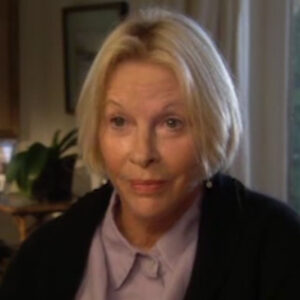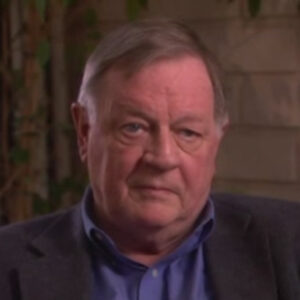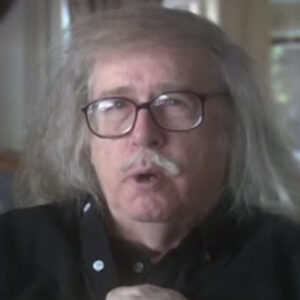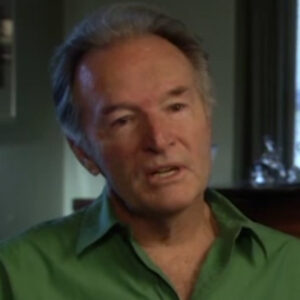Speaker Well, it was. I’m glad you asked that, I’ve been asked that several times, there are a lot of times during my life, I would say it was a it was a good I mean, it was interesting. My my we didn’t live right in Hollywood or in Los Angeles. My father, when I was 11 years old, took us up to a place called like Indiana up north west of Pasadena. And we had a big nine acre place up there. Excuse me. I was going to drive me crazy.
Speaker You can ask for an answer if no one is going to ever hear my question. So lots of growing up in Hollywood.
Speaker But growing up in Hollywood was was, you know, for a young fellow thinking way back and all those years where an older fellow thinking way back to when I was young, I was always cognizant of the fact that my father wasn’t a movie actor. However, I didn’t necessarily rub a lot of. I didn’t get close to a whole bunch of people with connections in the business because he moved us away from Hollywood, way up in northwest of Pasadena and like Enron, and we live in a big state up there. And and and then he drove me and my sister. He didn’t drive me. Somebody drove us down every every morning way, all the way down to Beverly Hills, to grammar school. And and that’s when I in the fifth and sixth grade, I was just a couple of grades behind Bob Stack. He was a good friend of mine, Robert Stack. Tim Holt was going to school there. Conrad, Nagel’s daughter was I had a sort of a crush on her in the fifth grade. And all the Doheny boys and girls, they were all there, it was a school of physical education. But you’re asking me about growing up in Hollywood. It was it was fun because I also after before I went to this school, I went to Black Fox military as a little boy and and we had to march up and down Hollywood Boulevard like a good, good little boy in military school usually do. And. Other than that, I, at a very early age, was sort of trying to keep track of what my father was doing as far as reading scripts when I was old enough to read. And and during that time within myself, I had a tremendous longing to be in the business myself and to maybe, maybe one day becoming a director.
Speaker I mean, your dad was won an Academy Award for the Informer in 1935, and there’s the famous story that his most pivotal scene for your father, who was your father?
Speaker And is that story true? Who was who was quiet?
Speaker One of the one of the big disappointments. For me, as a young man was to hear stories later on, actually.
Speaker To the fact that John Ford had had mentioned that my father performance was based on the fact that he had given him a lot of liquor during the course of a day and that he was pretty drunk when he did the scenes that he did.
Speaker And I don’t know. I don’t know. I have a feeling now that Ford probably bit his tongue several times when people brought that up because it was an absolute total, total, total lie. And I bring I bring to mind the fact that when I was 15 years of age and my father and I were walking around just going down to check the the lower 40, and he stopped suddenly and he said, Larry, I have to tell you something. If I get the informer, I’m going to win the Academy Award. And that has always been just blazoned into my brain all these years, and when that story came up, that was the first thing I thought of. And of course, what the heck, my father was in a hundred movies and I’m sure that he wasn’t drinking a lot of in any of them. And I want to bring them to to mind that in the quiet man, he was the only one also to be nominated for an Academy Award.
Speaker And what was your father’s career like? I mean, the Fox Jack Johnson said, you know, my father had a very, very interesting career as a young boy in England.
Speaker He ran away from home at the age of 15. He was one. He had seven brothers and one sister. And his father was a.. Was an Episcopal bishop. And he ran away from school when he was 15 and joined the lifeguards, which is the queen’s the queen’s regiment, you know, with the with the breastplates, the the red and the plumed hats, the black horses. And for a year and a half, he was a lifeguard and he actually rode and Queen Victoria’s funeral up until the time his father, my grandfather, pulled him out and told everybody that he was under age. And so that was that was the end of his career as a lifeguard. But then early in the century.
Speaker He left on his own when he was around twenty twenty one twenty two and left to come to Canada right up around the the north even parts of, say, to Washington and became a boxer. And it became a very, very good boxer, a prize fighter.
Speaker And in 1999, 99, I know this is a few years later, he fought Jack Johnson in Vancouver, B.C., the first fight that Johnson fought after winning the title from Tommy Burns first fight. And that’s in all the record books and in the latest documentary on Jack Johnson. That’s documented very, very nicely. And I have the picture right up on the wall of my father and Jack Johnson in the middle of the ring. And then after that, of course, he was called back to England when World War Two one started. And immediately joined up and as a physical. It wasn’t long before he was a captain and he he ended up and I have all the documents to to prove this and to very interesting to read. My father was the assistant provost marshal of Baghdad, which in today’s world, it’s kind of interesting. And also the fact that he spoke fluent Arabic. The sheiks used to come over when I was a young lad and sat me on their lap and said, you know, your father is the only Englishman that speaks Arabic with no accent, and I’m lost all the time. He died. My father would find some cronie he lived on in Newport Beach. He’d find some cronie to go and speak Arabic with him. And he he I always thought it was amazing that he was able to learn that such a difficult language in such a short time.
Speaker And then when he moved back to England and married my mother in 1919, he really didn’t have a job and.
Speaker Know what he was going to do, so we went back to prizefighting and the very posh fight arena in London is the National Sporting Club. In those days, everybody wore tuxedos and it was something special. They don’t do it in today’s world. But anyway, he fought he was fighting the main event. To make a living, he went back to boxing, he was in actual fact, he was 34 years old. And at the end of the five.
Speaker A producer came up into the ring named Jay Stewart Blackawton and said, I’m doing a. My first color movie ever made in this country, I don’t know whether it was Technicolor, but it was color and would you be interested?
Speaker So that’s how my father got into the movies. He’d never done any acting before. And and and then he did a lot that started to do one picture after another. And through 1920, through 1924, he became a pretty well-known movie actor and in England and until Hollywood finally called him in 1925 and he left and came, came to Hollywood and he.
Speaker Over the years made 12 films with John Ford, what was the relationship between Victor McClarkin and.
Speaker Well, actually, the way the way that all works is.
Speaker Starting in 1924, he had one picture after another, he worked for a big director named Frank Lloyd, and then he teamed up and what was probably one of the biggest one of the biggest box office teams of that time was my father and Edmund Lowe when they did what price, glory and Cockeyed World and women of all nations and a series of movies of sort of Captain Flagon.
Speaker Sergeant Quirt.
Speaker And and he was at that time became a big film star and 20th and Fox Film Corp. put him under exclusive contract and John Ford was under contract to Fox at the same time. And so in during the silent era starting and I think in nineteen twenty six, he did his first film with John Ford and then he did one in twenty seven, he did one in 28 called Hangman’s House starring for John Ford. And guess who one of the extras was. It was a film where there was a horse race involved and one of the extras on the fence was with John Wayne at that time. And so in nineteen nineteen twenty eight, he was 21 years old. That was Dick Wayne. So after that, my father made a not a tumor. He made one call, strong boy, another one he made over about three or four silent films and then did pictures like the Lost Patrol, started the Lost Patrol for John Ford.
Speaker And from there, he did the informer for John Ford and won the Academy Award. And then the year later, he did we really wanky with when the Shirley Temple and actually Ford wanted him for the long voyage home.
Speaker And my father by that time was was pretty well with a pretty big star. And I think Ford thought that he should work for him for a little less than he wanted to work for. So my father passed on the long voyage home and Ford cast Thomas Mitchell in that part and Mitchell won the supporting Academy Award. So that was my father’s tough luck. But anyway, my father’s career still went on through the. Through the 30s and and the 40s. He didn’t work, actually.
Speaker With John Ford until nineteen forty seven when he left Fort Apache. And and then he did what went from Fort Apache to shoot, she wore a yellow ribbon and then Rio Grande, which is a trilogy of those famous John Ford pictures. And then and then, of course, 1951. Ford cast him with Wayne and Maureen O’Hara and the quiet man.
Speaker What was the relationship like with your father? Well, off off the set. And they were like all old friends.
Speaker I mean, from 1926 to 1951, my father made twelve pictures with John for 12. And and let me put it this way, they were friends and it was Vick and Jack and they knew each other and and and I got to know John Ford’s kids and and Mrs. Ford, Mary Ford and and but my father was never, I would say, a close, close friend of John Ford’s, except John Ford always seemed to go back whenever he wanted somebody to, playing a part that might fit my father. I noticed he always cast him.
Speaker So anyway, I think they had a nice relationship, except that, you know.
Speaker Foreigner is a strange man, I mean, I don’t know how many really close friends he had. I think he could probably count John Wayne as a as a close friend. I’m sure that Ford thought he was. If I were to ask, do you feel like you’re a close friend of John Ford, he might have said, well, I’m a good friend, but I don’t know how close I am.
Speaker And I can always remember one of the things that stands out in my memory as far as sort of like. Watching Ford, directing my father. Was on the quiet man, and I was I was just in on that picture and I was right there on every every single scene that was shot and was very Hokkien when it came to anything to do with my father. Anyway, we’ve been in Ireland and we came back to the Studio Republic studio and we’re doing the big scene where Daniher Moreno mine. O’Hara’s brother is supposed to sweep the diary of the wedding between she and her and John Wayne off this table.
Speaker And we’re shooting the scene and I’m watching it very, very intently. And all of a sudden it says, cut. I mean, this is a victor.
Speaker He said, will you please watch Maureen? Keep your eyes on Marine. OK, roll it. Cut, Victor. When you watch Maureen, this went on for three or four times. Finally said cut. He said, Fred, Victor, are you going to watch? Maureen said. Back and I am watching Maureen. Very angry.
Speaker I mean, isn’t that like he didn’t know John Ford was?
Speaker Ford said, OK, that’s a wrap, going home by one o’clock in the afternoon.
Speaker The whole company disbands after that little setu between my father and John Ford.
Speaker I followed my father out to the dressing room. Trying to keep him from going, I think he’s going to have a heart attack. He was shaking so badly and he said that that damn Jack I mean, what’s wrong with him? He was I mean, what is wrong with him? And I said, I don’t know, Dad, but let’s just take it easy and drive home safely. And and I finally put him in his car. He drove away, walked back on the stage. I was making out the next year’s call sheet. Not one soul was on the stage. They cleared itinerary with a one o’clock wrap and all of a sudden, right from nowhere, stepped John Ford right from behind the scenery.
Speaker I said, where’s your dad? I said he went home.
Speaker Was he mad at me? Was he angry? I would say I told him, I said, yeah, I think he was very angry. Oh.
Speaker All right, and he turns up, turn his back and left. So the next morning, I have to tell you that when it came time for Daniher to sweep that stuff off of that table, the table was almost knocked over. And I need needlessly have to tell you that it was the first take that was printed. But that was that was just kind of a. During the time that I watched on the quiet, all the scenes with my father, very, very seldom did my father really I mean, would be Jack Ford pick on my father except this one time. And if he was trying to get something out of him, he got it. Because although for me, I didn’t think that he’d ever have to do that with my dad because he’d worked with him so much before. And I thought my dad was pretty, very, very good actor.
Speaker What was a typical day like on the fourth set?
Speaker A typical day was for me. I was at that time of first assistant, but in order to go on the picture.
Speaker I had to take a I had to be called a second assistant because Wingates Smith was his brother in law, was his official first assistant. But when you get in a room together, he was an older man.
Speaker He was he was a very good fellow, but he was tired. And he just let me do a lot of did all the work. I stayed at Ford shoulder for the entire picture of the quiet man and.
Speaker It was it was just very, very interesting, I mean.
Speaker People say that the usual force that began with Danny, he was playing the accordion and then he would have tea in the afternoon, that he did those rituals, were they intact when he was doing?
Speaker One of one of the things that I remember best, not best of all, but I certainly remember, is the first day of shooting on the Quiet Man first day.
Speaker The production manager was named Lee, look at their very good friend of mine and he said he wants every actor in wardrobe. He said the old the old saying as if they’re getting paid, they should be on the set. So every actor was my father. Everybody is John Wayne Moore and all on, however. There was one actor that wasn’t on the set and on purpose on the production manager, myself and Windgate decided that Frank Ford, John Ford’s older brother, didn’t have to be on the set because he’d have to have a beard put on. And we knew that he wasn’t in the first shot. So anyway, everybody’s waiting, John Ford come, he sits in his chair and chewing on a cigar a little bit, so well, first shot, I’ll be frank. He looked around what happened? Obviously, he looked around and didn’t see Frank, so he just took his shot right out of context, make it close up of him watching the fight, sitting by a tree next. That’s the first shot will be with Frank. You should have seen a bunch of us production guys running around like where’s Frank? Waking him up, getting a beard on and about 10 minutes. It usually takes an hour and presented Jack Ford with Frank for the first shot. But that was a little joke that he played on. He didn’t he didn’t smile at all. Just went on, did it?
Speaker But I’ll always remember that.
Speaker Whatever lessons you learned from Ford, Myer, you were working as a second lady on the set, I mean.
Speaker How did he come to you to explain the choreographed stage there, to fight the big fight scene between the fight between my father and Duke when he took the picture? There are always times during the course of one day that maybe we’d shoot a piece of that fight that went on and on and on. And not only that, there were a lot of doubles and some doubles were used for Dirk and for my father at one point.
Speaker I don’t know. I think I think Ford just did it for the fun of it. You know, Bond was playing the priest.
Speaker He told Walk quickly, get it downers because it’s just Vic’s back. And it was some rough kind of a thing you’re doing with Derek. And so for that one shot, Ward was even telling my father, which nobody will ever know that, but I certainly knew it.
Speaker And.
Speaker He is a great man to watch. I mean, I I learned a lot, I stayed right with him. I, I tried to I was a little disappointed.
Speaker He never he never really bawled me out.
Speaker And I thought, well, with his reputation and from what I know about John Ford, he has to get angry with somebody or maybe he doesn’t like me. But anyway, I don’t know, I it all worked out well.
Speaker I worked awfully hard.
Speaker I there was even one time when when we got back to the studio that the entire cast were carrying all the furniture and stuff from the wedding back to and they’re all drinking champagne and they were drunk and they were coming right from.
Speaker OK, there was one time there was somebody somebody has to grab the kind of can we cut it from. That’s too bad, damn it. Sorry.
Speaker OK, so yeah, it was worth.
Speaker There was one scene after we got back to the studio where we had an indoor set of light a morning that everybody is carrying furniture and belongings and everything back to the the honeymoon house where they’re all drinking champagne and they’re all a little bit drunk and something seemed wrong to man. And then it dawned on me that they put different wardrobe on than they were wearing at the wedding and they should be in the wedding wardrobe still going into the early hours of the morning.
Speaker So I went over and I tapped Jack Ford on the. And I told him, I said, I really feel that the the wardrobe is wrong, you know, it should be the wedding wardrobe. They’re coming. He looked like looked up at me. Thought for a minute, reached in his pocket. I could tell it was an empty sheet of paper, put it back in his pocket, he said. As I made I made I made a note of that thank you, thank you and we changed the wardrobe. But anyway, I mean, everything is fine. I mean, he was a complicated man for it.
Speaker I mean, some people describe him as pretty irascible, but it got a great visual eye.
Speaker You know, he knew how to get his actors. That stock company had the fourth stock company he had that way. What they always seem to do anything he wanted.
Speaker But what was what was what was who was he like?
Speaker I’ll tell you one.
Speaker John Ford was one when they when they cut his image, that was about he’s the only guy the only man I’ve seen like John Ford with John Ford.
Speaker We have a.
Speaker Gerald Ford was a one man who was one of a kind.
Speaker If I were to describe him to you, I mean, I can just see him right there, right in front of my face.
Speaker You kind of had to he always kind of moved his lips around and and and he had a Maine accent, New England accent. He was a.
Speaker He was very definite about what he wanted when it when he asked for a scene, but he also I always felt he got the natural.
Speaker Responses, the natural that I don’t know how to really put this because. It’s part of his M.O. was to to to to try to make everything a very not forced, not acting very natural and knew the inside of the character.
Speaker So he knew what he was looking for, you know. And.
Speaker Anyway.
Speaker I every every everything was was was fun to watch, I mean, like the scene with with with with white bodies trying to fish in a quiet and we’re going to have Harris trying to tell her that she hasn’t she hasn’t had an intimate relationship with her husband. You know, I thought that was a wonderful touch.
Speaker You know, that was a terrific scene. I was right there, a little stream right down there by Ashford Castle with one in the water there. And a terrific scene.
Speaker I mean that I think that one of the things about John Ford in my book is that.
Speaker He was he was a very real. He looked for realism.
Speaker There’s probably a lot better and more distinctive way of describing it, but and and he knew how to get it out, the actors.
Speaker And I also think that with Ford, when he cast somebody in a part, he cast that person apart because he knew that he fitted that part. So he didn’t have to explain to him too much about this and that the whole thing. And then, of course, he expected the actor to deliver and and he did have his favorites is no getting around it, you know, both in leading women and in men like Vera Miles.
Speaker He he he he used several several girls to think of them exactly at them. Well, Maureen O’Hara, of course, I’ll start that again.
Speaker Who was the one that was in the circus? No. The Indian won.
Speaker Oh, to which one to go together, you know, the blonde.
Speaker I hate to hear several miles now in the big Indian thing he did with Gilbert Roland and oh, it was Carol, Carol, as always, Carol Baker, Vera Miles and the and the one that was.
Speaker Yeah, the towers, so I’ll start again.
Speaker So immediately I had a lot of the leading ladies that he had favorites. He like Vera Miles, Constance Towers.
Speaker Carol, back outside again for.
Speaker And besides the leading men and men in the cast, John Ford also had a favorite leading ladies. There was Vera Miles Torso’s Towers.
Speaker And that’s driving me crazy, Carl Bacon, who’s the other one, is to South Cal Baker for three more. I’m going to make this, though.
Speaker But besides having a lot of favorite male actors that he used throughout his career, Ford also like to use the same lady from time to time, like for miles at Kansas Towers. He naturally is Maureen O’Hara as much as possible and.
Speaker And Carol Baker, I mean, Carol Baker was in.
Speaker I’m telling him I hate it, not I do that sorry, just say I about. I’ll try one more time.
Speaker Besides his favorite male actors, which he used in many, many films, and they always call it in the latter years of his career, they call it the Ford Stock Company, although my father was with him long before the stock company existed, before John Wayne even existed. But he he you know, starting with Katharine Hepburn, he was she was a big favorite, even when Mary Queen of Scots with her, I don’t think he ever used her for another movie, but I know that she was a favorite. Maureen O’Hara was a big, big favorite, Vera Miles.
Speaker He used a lot of Constance Towers and and and and a couple of others that, you know, that that he seemed to like more than than the rest. You know, he had favorites.
Speaker Your father worked with George O’Brien in the Iron Horse and other films, he worked with your dad. He worked with Barry Fitzgerald. He worked with Jeffrey Hunter in a few movies with him and Wayne. They also did a lot of films together. And you worked with Wayne on a lot of films.
Speaker What was unique about that Fort Wayne relationship in the movie?
Speaker Very interesting, because, you know, Ford. I think that for. Considered Duke almost like private property, in a way, but.
Speaker I go again.
Speaker That’s an interesting question, because actually John Ford and Dirk Wang were a team in a sense, I don’t know whether Dirk realized that as much as John Ford, because I really feel that John Ford felt that.
Speaker So that Dirk was almost like personal property.
Speaker He he started him as a big star in Stagecoach, and from there on, I mean, Duke just did nothing but go up and became the number one movie star in the world.
Speaker However, I have to make a quick thing on that is that it wasn’t in a sense, John Ford did not discover John Wayne because Raoul Walsh discovered John Wayne and in the big trail in 1931.
Speaker But that because as it may, eight years later, John Ford then made him into a big star, because after the original one with Raoul Walsh duked it up months and years, a small little of Westerns and movies until John Ford finally picked him for a stagecoach. And then after that. You know, I’m sure I’m saying the truth, that when Ford says, you know, we want you for a movie, I don’t think they’re even worried about reading the script, you know, so he was going to do the movie. And not only that, I think as far as the business was concerned, John Ford, John Wayne movie was a big movie. Anybody that was able to get those two together, they’ve got something big. And and that’s the way it worked all the way up, you know, through the quiet man and and beyond. And and during that time, of course, Wayne and Ford were we’re close friends, I mean.
Speaker Klaus. I don’t know how personal friends they were, although I think.
Speaker Fairly personal, but. But Dirk Dirks, a man, was a man of. He’s an unusual fellow himself, you know, and I think he admired John Ford, thought of him as a. I think he might have. On a personal level, I found some shortcomings.
Speaker You know, it’s pretty well documented and I’m not telling any stories out of school, but but John Ford, the genius that he was, is a movie director. He was also an alcoholic.
Speaker And I think he he he knew that himself, that he was and.
Speaker That’s been documented in print a lot, so it was any time that he ever got hold of any hard booze, John Ford could got pretty drunk. I’m not taking away from anything as far as his career or his talent is concerned, but that’s the way it was, however. And you’re only your own and you’re speaking as somebody that worked with him on one of his most famous pictures, I have to admit, the quiet man. And he made an edict.
Speaker On that picture, no drinking.
Speaker And I think everybody probably I know that John Wayne was sitting like a good little boy playing chess with his wife, who was shot at the time and asked for a castle I used to watch a duke was being such a good boy. And and I think the anybody that might have escaped that was my father and some of the Irish priests came around and wanted to visit with my father. I’m sure that he had a couple of nips with him in the bar. But I think John Ford turned turned his other.
Speaker He turned his head, however, at one point for now, walking through the castle on a weekend and there were but we looked right through the tea room into the bar. Jackie McGoran was a little fellow that took the thing. And Dana said, put that and put his name down and put a line through it. A little Irish actor and just a jack for an hour walking through. We saw him go long, fell right on his face in the bar mcgoran. He said, take him off the list to go to the States.
Speaker OK.
Speaker The next day, I told the production, as I said, Jack Ford wants me to want you to take McGoran off the list to go to the States.
Speaker And production manager said, oh, God, I didn’t like that little guy anyway. Oh, boy. I said, how stupid can you be? How stupid can you be? When he walked in the door here in Ireland, who’s going to walk out the door when we hit the studio? What do you mean? I mean, why why are you so happy about it? So we’re all gathered outside Ashrita Castle ready to go to the airport. And Ford says, Where’s McGowan?
Speaker And look at that. Well, you said not to take him, you’re silly, so and so.
Speaker So and so and so.
Speaker Anyway, that was a little bit of John Ford.
Speaker You you were you were explaining that Dwayne was know, pretty close to John Wayne. What was unusual about?
Speaker Well, he was actually the same way in.
Speaker Do I say to Derek Wayne, I was just. I felt really close to him. I mean, he was a lovable, great human being. He was thoughtful, he was a family guy, he loved his kids, loved his wife. Although he had he had.
Speaker Three wives at. But that’s just one of those things, but.
Speaker He.
Speaker He was very easy for me to get along with, I mean, I was lucky in a sense because he he watched me direct for about six years before he thought it was time that I could maybe do a picture with him, which was McLintock.
Speaker And then after that, I did form, I did five altogether. So. I feel that. We had a certain something because if he.
Speaker Together, because if he didn’t feel at home with a director, I know that he can make life pretty tough for them.
Speaker I heard he was a pretty difficult guy.
Speaker And and in five movies, five guys that were five seconds, the nice man.
Speaker Oh, yeah, good. I mean, from grammar school, I know, you know, from time to time. He died at the age of 84.
Speaker Good guy, Bob Stack and Rosemary, his wife. Oh, yeah.
Speaker That’s what surprises you, is the thinking about any of these actors of these leading ladies like Jane Crane and people like that, then all of a sudden you see there died at the age of 78.
Speaker Hey, listen, you little mutt. I’ll tell you what, if that’s the best gift he’s got in his mouth, I would take it away from him. That’s.
Speaker As a director, what was it I mean, how is it different for them? Well, the Hawks, I mean, they were strong independent directors. They were under the Hollywood system. You came along in the 60s and the 70s and 80s.
Speaker The Hollywood system was changed for directors. What was the difference to you in terms of informing them worked on the Zadik?
Speaker Well, you’re talking about, I think, asking whether the studio system. Studio system is totally different than today’s system studio system, they had actors and directors and producers under a yearly contract week to week, 52 weeks a year or 40 a week contract. And Jimmy Stewart always used to say to me over and over again, boy, I really like those. The studio, the studio days. He said I would. He said, you know, when I was at MGM, I had finished a picture on Friday and Louis B. Man would come on the set and hand me a script.
Speaker And he said I’d be starting another picture on Monday or Tuesday. But he said, I like that. He said he just like that. And Clark Gable was making 6000 dollars a week, 52 weeks a year. And MGM is probably the highest paid star. And that’s just like peanuts today. I mean, that’s three hundred and some thousand dollars a year. And today’s world where stars are getting 20 million per picture, that’s a whole different ballgame. And you’re asking about directors. Directors today are usually they’re all independent. There’s no such thing as a contract director today. So what what you’re doing, you’re probably living you’re living on your last picture. I think that really works for you.
Speaker You take some even the biggest directors and I won’t mention them by name if they’ve had a bad box office film and maybe one more. Maybe you won’t see them for a while. I mean, it’s a matter of being hired.
Speaker And there are a lot of young directors coming up, along with the writers, if you’ll look at the production schedule on The Hollywood Reporter, for instance, that comes out once a week. See, all the pictures are being made. Forty percent of the pictures are being directed by the writers.
Speaker And.
Speaker There’s something wrong with that because, you know, a writer might be a good director. But there are a lot of directors that you go through the list that used to be in the old days, you go through it and you see Frank wiseacre, John Ford, Mervin Leroy, you name them all, all these big time Howard Hawks, Frank Morisaki, these are the directors of the Golden Age. All the big pictures were all directed by famous directors. Not big pictures can be directed by somebody you’ve never heard of.
Speaker I would feel like by the 60s, you know, after he had of Injury and Liberty Valance in his last film.
Speaker How do you feel about the Hollywood system that do used to tell me, you know, I always ask how I was Jack Ford getting along because sometimes he was ill a little bit and finally he was terminally ill. But he said, well, he is kind of mad at the world because.
Speaker He’s not being employed, he’s unemployed. And I don’t know, I I would like to think that financially, Jack Ford ended up. Comfortably. But I kind of doubt it. I have I have my doubts about that. And it’s very sad that somebody that did all the work that Ford did, and I don’t think that he ended up a big, rich man. And I know he I think he ended up a sad man and a disappointed man that he wasn’t wanted as much as there was a time that he got. John Ford is like getting gold. And then there comes a time when was John Ford? And but in today, as time goes by, in retrospect, John Ford is like the God of of of the golden age, he probably he probably go down as is one of the great, great directors of all time, which incidentally, you don’t win four Academy Awards without being a pretty good director.
Speaker It was the last time you saw a job for.
Speaker Last time is hard for me to remember. He died in 73.
Speaker Probably within I don’t know, I think I think I bumped into him. I know that in 68. Underrating Dukan, the Hellfighters, and he said, you know, Jack, what’s coming on the set today?
Speaker The funny feeling for me, I mean, here I am, a guy that was running around after him and the quiet man and unfortunately killing myself.
Speaker And old kind of old man would marry his wife, a terrific lady. And he didn’t have much to say to me, you know, he didn’t know his hello and that to say he sat down very quiet.
Speaker But I do remember that right in the middle of a scene, he dropped his watch bag. He dropped the lighter. I acted like it didn’t even happen. But it was quite something to have for it coming on my set at.
Speaker And the funny thing, I mean, the world turns that.
Speaker I guess after you had worked on the quiet man with with with Ford and Wayne and the stock company, he went on and worked on the.
Speaker Big Jim McLay, you’re right, after, after after Quitman and went on to Big Jim McClain in Honolulu.
Speaker And what was that experience like? I mean, there was pretty political one there, so.
Speaker Well, I think he was I think I think he was as a matter of fact, he was a.
Speaker Preaching his conservatism a little bit, but at the same time, if somebody were asked directly if he.
Speaker Was that much of a political. Activists as people thought he was in denial. So I’m really not.
Speaker He said, I can’t say the same about Ward Bond, but but do I think you know. He was on the other side, he was on the right side of the fence, let’s put it that way, there’s no doubt about that. Charlton Heston is on the right side of the fence and a lot of the actors are on the left side of the fence. And there has to be two sides of the fence.
Speaker So that’s politics. I mean, that’s that’s every time. Every time there’s a presidential election. So but as far as Turkey being a big pressure, he was probably outspoken in some instances, but. Didn’t go out of his way to to offend too many people.
Speaker When he went on and directed the Green Beret, it’s a surprise he directed he didn’t have someone else do it. Why? Why was that?
Speaker I was supposed to direct the Green Berets. Did you know that I was for all the preparation I was I was going to direct the Green Berets and then and then for some reason or another, they postponed it. And I wanted to say, look, you postponed it.
Speaker And now I’ve been offered a picture of Bill Hall and to do the Devil’s Brigade, they said, well, go ahead, you do that. You know, the first thing you said, they said to me, is there a part of that for me? And then so I went ahead and did the devil’s regain. And he went on and did the Green Berets.
Speaker But you also worked on them. I was asking you earlier about when you compare directors, you worked on two films with Bill. Well, I will interview a son on Thursday, William.
Speaker You worked with him when I was in the sky and high on the right track of a cat and the track of a cat and dad had a blood alley. But what was how would you compare the directorial styles of.
Speaker Well, and John for.
Speaker Probably Wellman was more.
Speaker Friendly and talking to the crew and one of the guys.
Speaker You know, John Ford walks on the set, whether you want to wear it, I’m sure that he realized that people were just. He was like he was like a king when he walks on us, said John Ford and everybody on the set, whether it was on pins and needles about doing things right and. Really, you know, wait for him to speak before you speak to him. Well, Welman was a little different.
Speaker He was chatting with the Grip’s and having a horse running race with the first group and a little more a little more friendly. Not the Jack Ford wasn’t friendly, but he was just within himself a lot more and. Uh.
Speaker I also think that.
Speaker The woman with a sort of a gregarious type whereby I don’t think you put Jack Ford in that category, you know, it’s more of a quiet, silent. Uh. Mysterious type of.
Speaker You you want to direct and you work with. Going on Clinton, I call us Marshal Hellfires, Chisum.
Speaker Was that working relationship? What was it like working with you, working as a director with way and then knowing how we worked for this story?
Speaker Well, I just had to I just of because, you know, I didn’t go on thinking, oh, my goodness, there’s a John Wayne. I didn’t have that feeling at all. I might have if I hadn’t done it for so many years. I mean, in 62, I first started working with Wayne in forty five. You know, when I first went to Republic, first picture was with Derek and you got Dakota December DeCota a roster and Walter Brennan. That was the first movie I haven’t worked on. And so forty five to sixty two when I started directing and. I mean.
Speaker I knew him very well. I really knew I really knew a lot, you know.
Speaker I told you the one story I should tell you about the quiet man and drinking, and I told you about it, maybe didn’t know drinking. So one day he calls me over at three o’clock in the afternoon, says Andrew.
Speaker Yes, sir. So go and tell Dirk that he can he can have the afternoon off three o’clock.
Speaker Oh, OK, great. Over and tell him you can have a drink. So I went over to I say, guess what, you’re off until three o’clock, according to the old man.
Speaker No kidding. OK, see you later.
Speaker So I come about five thirty or six. We wrap the company.
Speaker Joining forces, Andrew, come on, you’re going to ride with me tonight.
Speaker So I for two, was up in the front with the driver and I’m sitting in the back and we ride in the limo and drive along with Country Road, come to a place called Ma’am Cross. And it was a it was a little sheep dipping place and sheep sharing and about one eighth Irish bar. And where we go, we got out, went in there.
Speaker And I have to tell you that that was all the way gone.
Speaker All the way gone.
Speaker He looked at us and he didn’t recognize what they did, but he did. I fell and we were just sort of smiled.
Speaker Jack Ford smile and I smile. We went home and.
Speaker Later on, later on in that, I saw it going up the stairs and there was a story made under each arm.
Speaker Guy that didn’t know any better, the next, a guy that wins a strong man, I saw him walking up the stairs last night with with a cleaning man under his arm, didn’t know that they were actually helping him up the stairs. But the other thing is that that night I was I woke up and I thought, oh, God.
Speaker So I went down to the hotel kitchen.
Speaker I got a I got an egg sandwich and a glass of milk.
Speaker And I went up to Duke’s room about midnight and I knocked on the door and he would come in. I gave him that milk with a and pointed, You are my savior.
Speaker Here are my savior. He had the worst hangover that you were for. That was that was about the only big drinking that happened on that quiet man. Was the last time you saw way?
Speaker I saw when he died in.
Speaker Yeah, I went to 79, I went to see him back in the Massachusetts General, I was going across to make that picture with Britain and in Germany, and I stopped to see him. He was having a valve put in his heart and all his four kids by his first marriage were there. Patrick and Michael. Michael and. And and.
Speaker That just drives me crazy when I do that what?
Speaker Was one of those names a nickname? No, no, no, no, I want to start that sentence again. Um.
Speaker Is that you’re talking about a black. Two daughters.
Speaker That’s by a second wife for a management and drive me crazy. But anyway, just a minute.
Speaker Brian. You have a book in front of you ways for children. Patrick, Michael.
Speaker I mean, like my my own kids, I know him so well. Um, let me get a blanket like that.
Speaker He desires for his four children. It’s still relevant. Yeah.
Speaker Ethan Aisa and it was Ethan and Ethan is a no no and the other three. So you had seven kids. I mean, that is just too much.
Speaker You’re not rolling in the good stuff.
Speaker That’s a good story about the falling actually that used fell out.
Speaker Fourth season mean we’re talking Henry and your dad and even the George would seem to be close to these men, but they would have to where they would fall out.
Speaker They would work for your father, for John Ford for a long time.
Speaker I don’t know whether that’s how Crushin Ford seemed to, you know, had these very close male relationships with people like George O’Brien, Harry Carey and Victor McClarkin. And then they would be if something would happen and they wouldn’t work for him for 10 or 12 years.
Speaker Well, what happened with George O’Brien, for instance, is that I don’t think he really had a falling out with him, George, before he went into another, he started doing a series of Westerns and stuff and sort of just went away from the kind of pictures that John Ford was making. He starred for Ford in the early before he became a Western star. And then and then later on in George O’Brien’s later career, he was getting a lot of featured parts and most of the in the trilogy, I think it was in all three of them.
Speaker And I think he was in the one about Spig way too.
Speaker He wasn’t. She was in Rio Grande, modern Rio Grande now.
Speaker But and with Harry Carey. Harry Harry just got got old. I mean, he just sort of retired from movies and I don’t think he didn’t have any coming out with him at all because he very close to his wife as Ali. And the only one that I can remember a little bit about as Ben Johnson, whom he thought was you know, he starred in some movies besides the trilogy, and he had him in a wagon train and a wagon master and and all of a sudden he stopped using Ben.
Speaker And I know that because at that point I was doing Gunsmoke. And when I could, I’d get I get Ben a job on Gunsmoke and then that’s what the worm turns and then becomes a a sort of sort of a sought after actor and wins the Academy Award. And he ended up being a really well respected actor.
Speaker We were talking before we stopped about the last time you saw John Wayne.
Speaker The last time I saw John Wayne was in 79 when he was in the Massachusetts General Hospital and I was on my way to make a movie with Richard Burton and check in Germany. And and I start with the whole family, was there a Michael and Patrick and Tony and Melissa there, all the four children by my Derek’s first wife, Josie, and we just had a riotous time and had a great time.
Speaker It was in Boston. And when I went in to see Derek, he was sitting up in a chair and he had pipes.
Speaker He had everything was hanging out of him. I could hardly see him. He had so many tubes in him. And the next day, apparently, according to Michael, he woke up. He said, Michael, you know, I had a I had a dream that I had him and he was here. And Mike said, you’re right. He was here.
Speaker He talked about working on the quiet man.
Speaker I asked you about his relationship with Wade and when before we would talk about the relationship that Ford had, Marino had, what was that like? Because we had written a book about her life and her working with for.
Speaker Yeah, I mean, I’m sure that people might have thought that there was.
Speaker Things going on between Maureen and John Ford, I would.
Speaker I would guess that they were really close friends and. But I don’t know how.
Speaker I don’t think there were close calls, but I have read Maureen’s book on on the subject and. She has sort of a two a two sided sword going, I mean, she praises them to the heavens and then she gets mad at them.
Speaker But not for sort of discontinuing her young brother’s career in the movies, Jim, and.
Speaker And then on the. But I love him, so that’s that’s OK and I’m sure she did. I mean, let’s face it, she did a lot of good work for Ford. A lot. And and I think she really respected him as being one terrific director and. I think that she knew him well, let’s put it that way.
Speaker But I only know what I read on some of these things, I mean, I also read it that for it at one time had a romantic interest with Katharine Hepburn.
Speaker Right. Yeah, if I have, this is going to be my last question. I mean. John Wayne, you know, is considered by, you know, a great American star superstar, well, by some people a super patriot.
Speaker We sometimes you mentioned John Wayne think to people and they just become they could go crazy because John Wayne, right wing conservative, you know, I you stand to watch his movies.
Speaker People say to me all the time. And I said when I grew up, I was watching Wayne and Tall in the Saddle and the fighting cowboys and dark men and women.
Speaker And I never thought of it that way. How to one think about John Wayne today?
Speaker I think that you ought to think of John Wayne as a great human being. One of the biggest movie stars of all time and a very patriotic guy. And I don’t think he was he had his own beliefs politically, but they were so they weren’t what everybody wants to agree with. That’s too bad. But as a as a man, he was straightforward. He doesn’t beat around the bush. He saw things as they they were he he loved the movie business.
Speaker I think he really appreciated being a big movie star. He was everything that you’d expect. He had a lot of charisma.
Speaker I mean, you talking about a charismatic guy with was John Wayne. And he walked into a room. He filled the room, you know. And he had a good conversation. He loved to be around women, he used to you know, he liked to play bridge with my wife. He was. He was just an all around terrific guy and. I know I know that a lot of people probably dislike him for whatever his political beliefs might have been, but that’s too bad. I mean, everybody has has has what they believe in. As a matter of fact, if a whole lot of friends ever get in a room together, the one thing they should never discuss is politics. And it should never it should never come into any kind of a any kind of a social session should never include politics because there’s bound to be some friction going on and it’s not necessary. That all happens outside of the drawing room.
Speaker People say it the way were cut from the same cloth politically or do you think?
Speaker I’m not so sure about John Ford being that conservative.
Speaker I know that he was a big you know, he’s a Navy admiral or commander, and I know all his good work, he joked during the war.
Speaker And I as a matter of fact, I think that Ford was apolitical, I don’t think he misspoke his politics very much.
Speaker If he did, he kept it very private.
Speaker And. A Ford was.
Speaker Somebody that you can never forget. I don’t know if you’ve ever met anybody that had known John Ford, but he’s a he’s somebody that will remain in your memory. I mean, he’s. Although his personality wasn’t that outstanding, he wasn’t a big talker, I mean, he wasn’t, but it’s just his whole demeanor. As I said, perhaps once before when he walked on the set, he knew that he was God.
Speaker And he just without without anything being said and people were very, very, very cautious around him saying the right things.
Speaker And but at the same time, you know, he wasn’t somebody that wouldn’t talk to you.
Speaker I mean, he just he was an outgoing fellow like Bill Wellman. I mean, Bill, when I was talking to everybody.
Speaker But let’s face it in his way, John Ford was in the golden age of movies, John Ford was a genius.
Speaker And and it’s too bad that the young people of today really maybe if they start looking at some of his old films, they’ll catch on and what I’m talking about. But if you were if you’re in his heyday today, you know, he’d be doing some of the great big films. There’s no doubt about it. But that’s just too bad that he through age, he just sort of petered out like a lot of other famous directors. George Stamens and. A lot that I can remember, Frank Brzeski.
Speaker William Wyler. All big little Roy. They all had their day and they’re all.
Speaker Icons in the business of the 30s and 40s and. Probably up into the 50s. And after that, the business has changed a great deal. I mean, when you consider. That move is today, a major studios aren’t really interested in anything under 30 million, and unless there’s something very special or some 20 million dollar picture that some star is going to be in for, not take their full salary. But but I mean, when I was making the pictures of Wayne, I mean, when I did The Undefeated and I was right there when production had at 20th Century Fox signed the budget for seven million five hundred thousand. And I told you, I said, you know, this picture’s costing seven million, Derickson.
Speaker Well, they want to spend their money like that. That’s up to them. And that was a lot of money. A lot of money I did I did a picture call The Way West with Kirk Douglas, Robert Mitchum, Richard Widmark, Sally Field and her first movie, Four Months Up in Oregon, the whole trip from all the way.
Speaker All the way across the country, wagon trains a whole bunch of people, four million, six hundred thousand. Shenandoah. Two million six hundred thousand, I mean, and if you compare that to today, so when you compare the budgets, you know that the debt, the film industry has to be different. I mean, we’re talking about I mean, my my son’s doing a picture now of a digital picture was a Mecca with Robert Zemeckis and way well over a million in a way, over 100 million. And a titanic way over. So it’s a whole different it’s a whole different business today than it used to be.
Speaker My last question. Someone has written that John Ford was more like victim of blogging and he was like John Wayne. What would you say to that?
Speaker Well, a lot of people think that that John Ford wished he was like my father. He wished he was big and robust and physical, wish that he’d maybe done the things that my father had done. And then he secretly sort of a little bit jealous about the kind of life that my father had had and I think for to kind of wish that his life who was you know, he grew up sort of right when he was a young man. He was in movies right from the teens on up. And I think he when he I think he knew all about what my father had done and I think he was he was a witch. Did it happen to him?

